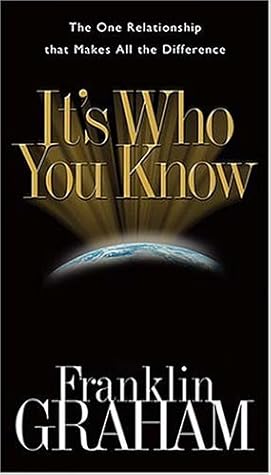- Bible
- Read the Bible
- Bible Versions
- Verse of the Day
- Reading Plans
- Verses by Topic
- Books of the Bible
- Bible Images
- Study
- Commentaries
- Concordances
- Dictionaries
- Encyclopedias
- Sermons
- Bible Atlas & Maps
- BP Wiki
- Devotionals
- Today's Devotionals
- Light of the World
- All Devotionals
- Inspirational Quotes
- More
- Picture Quotes
- Videos
- Inspirational
- Bible Study
- What The Bible Says
- Bible Q&As
- Daily Bread
- Bible by Genre
- Bible Stories
- Random Bible Verse
- Community
- Store
It's Who You Know: The One Relationship That Makes All the Difference
by Franklin Graham
The familiar phrase "it's who you know" is true for everyone; knowing the right people can make a difference in obtaining privileges, services, or assistance in daily life. However, not everyone has access to those in power here on earth. And no matter how many important people we might know, at some point we will not be acquainted with a "key person" who could help us in some way.
The good news is that each of us can have continuous, personal access to the most important person alive today! By claiming the forgiveness of God purchased through the sinless life, death, and resurrection of the Lord Jesus Christ, everyone can be on a first-name basis and have a personal relationship with the most important person who has ever existed.
"It's Who You Know" is an appealing, easy-to-read booklet that leads readers from the comfort, healing, and freedom available in the Name of Jesus to the ultimate conclusion-salvation and an intimate relationship with Jesus.
The good news is that each of us can have continuous, personal access to the most important person alive today! By claiming the forgiveness of God purchased through the sinless life, death, and resurrection of the Lord Jesus Christ, everyone can be on a first-name basis and have a personal relationship with the most important person who has ever existed.
"It's Who You Know" is an appealing, easy-to-read booklet that leads readers from the comfort, healing, and freedom available in the Name of Jesus to the ultimate conclusion-salvation and an intimate relationship with Jesus.
BUY NOW
Paperback, 64 pages
Published October 1st 2002 by Thomas Nelson (first published September 29th 2002)
© 2025 Bibleportal.com All rights reserved.

William Franklin Graham, III, born July 14, 1952, is the fourth of five children born to evangelist Billy Graham and his wife, Ruth Bell Graham. Raised in a log home in the Appalachian Mountains outside Asheville, North Carolina, Franklin now lives in the mountains of Boone, North Carolina.
He was born into a heritage rich in Christian ministry. By the time of Franklin's birth, Billy Graham was already known around the world as a spiritual leader, but he wasn't the only spiritual giant in the family. Franklin's maternal grandfather, Lemuel Nelson Bell, was a medical missionary to China for more than 20 years, a respected moderator of his denomination, the Presbyterian Church in the United States, and a co-founder and executive editor of Christianity Today.
At age 22, after a period of rebellion and traveling the world, Franklin committed his life to Jesus Christ while alone in a hotel room in Jerusalem. Soon after that, Dr. Bob Pierce, founder of Samaritan's Purse (and World Vision), invited Franklin to join him on a six-week mission to Asia. It was during that time that Franklin felt a calling to work with hurting people in areas of the world affected by war, famine, disease, and natural disasters.
... Show more